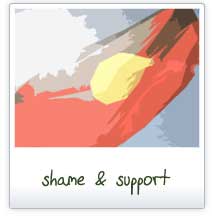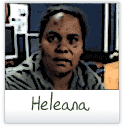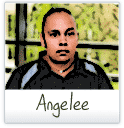 shame & support
shame & support
In the audio and video files in this section learners and trainers talk about their experiences of shame, as well as mechanisms to build a supportive and inclusive learning environment.
The concept of shame used by Aboriginal English speakers is broader than the non-Indigenous use of the word. The meaning of shame extends to include embarrassment in certain situations (Leitner & Malcolm 2007:169) and is often due to attention or circumstances rather than as the result of an action by oneself (Vallance & Tchacos 2001). The feeling of shame can totally overwhelm and disempower a person.
Leitner, G. & Malcolm, I. G. (2007). The habitat of Australia’s aboriginal languages: past, present and future, Mouton de Gruyter, Berlin.
- What the learners say
- What the trainers say
Don
 Don is a qualified mechanic. He has worked in this role for over 30 years in an Indigenous community.
Don is a qualified mechanic. He has worked in this role for over 30 years in an Indigenous community.
Don talks about the role of elders in providing role models and showing the way
Don talks about the importance of older people supporting the younger generation into education
Heleana
 Heleana is a trainee teacher and is enrolled in a Bachelor of Teaching and Learning. She previously worked in the areas of land management and eco-cultural tourism. She has completed the Certificates II and III in Spoken and Written English and is completing her final units in a tertiary preparation course concurrently with her teaching studies.
Heleana is a trainee teacher and is enrolled in a Bachelor of Teaching and Learning. She previously worked in the areas of land management and eco-cultural tourism. She has completed the Certificates II and III in Spoken and Written English and is completing her final units in a tertiary preparation course concurrently with her teaching studies.
Heleana talks about the importance of having Indigenous teachers and tutors
Heleana talks about study from a remote loaction
Heleana talks about more issues with study from a remote loaction
Heleana talks about the critical role of lecturer support and feedback
Joel
 Joel is a work-based apprentice at a regional university campus. He is currently enrolled in Certificate III in Business and is working in an office environment. He has previously completed Certificate III in Music and Certificate in Commercial Cookery
Joel is a work-based apprentice at a regional university campus. He is currently enrolled in Certificate III in Business and is working in an office environment. He has previously completed Certificate III in Music and Certificate in Commercial Cookery
Joel compares the level of support for Indigenous students in two high school environments
Joel talks about the importance of the lecturer in building a supportive classroom environment
Joel talks about peer support & shame
Angelee
 Angelee is a work-based apprentice. She is currently enrolled in Certificate III in Business and is working in an office environment.
Angelee is a work-based apprentice. She is currently enrolled in Certificate III in Business and is working in an office environment.
Angelee talks about benefits of a tutor
Angelee talks about friends and peer pressure
Angelee talks about Indigenous support
Angelee talks about how the teacher cradles them too much
Victor
 Victor is a ranger supervisor in an Indigenous community. He has previously completed Certificate III in Conservation and Land Management.
Victor is a ranger supervisor in an Indigenous community. He has previously completed Certificate III in Conservation and Land Management.
Victor talks about shame in the classroom
Marita
 Marita is enrolled in Certificate II in Spoken and Written English. She lives in an Indigenous community and periodically travels to a regional centre where her course is delivered in intensive study blocks.
Marita is enrolled in Certificate II in Spoken and Written English. She lives in an Indigenous community and periodically travels to a regional centre where her course is delivered in intensive study blocks.
Marita talks about studying away from home
Marita talks about support for a young mother to study at school
Marita talks about shyness and shame
Marita talks about feelings in the training room
Nardene
 Nardene is the current Vice-Chancellors Indigenous Career Cadet at Charles Darwin University. She is studying a Bachelor of Commerce specialising in marketing. She previously completed a Certificate IV in Marketing and a Certificate IV in Community Services.
Nardene is the current Vice-Chancellors Indigenous Career Cadet at Charles Darwin University. She is studying a Bachelor of Commerce specialising in marketing. She previously completed a Certificate IV in Marketing and a Certificate IV in Community Services.
Nardene talks about shame and support in the classroom environment
Nardene talks about the shyness and shame
Nardene talks about the support of her trainers
Nardene talks about developing confidence in VET and the transition into Higher Education
Nardene talks about the support structures for Indigenous students within the university
Nardene gives some tips to VET lecturers on supporting Indigenous students
Fred
 Fred is a VET trainer. He delivers Certificate I in Work Preparation in Indigenous communities. Most training is conducted in the workplace.
Fred is a VET trainer. He delivers Certificate I in Work Preparation in Indigenous communities. Most training is conducted in the workplace.
Strategies for trainers:
Identify elders who can act as role models and/or support or mentor younger people in the workplace and in training
Build links between communities, workplaces, workplace supervisors and training
Use Indigenous trainers and support staff to deliver and support training, where available
Communicate to students what academic and other support services (such as Indigenous support academic support, tutoring and library services) are available and facilitate their access to them
Take time to explain to students how training and the training institution works
Facilitate student access to study facilities out of course hours, particularly in communities
Motivate students by building a collegial learning environment
Include collaborative group work into training and assessment
Communicate clearly, in a form and style that learners can understand
Deliver training from locations where the learners are comfortable, including outdoors
Give clear and explicit instructions and direction. Let learners know what skills and knowledge they need to focus on
Clearly express the aims of the training and what the student should aim to achieve
Ensure the curriculum and the course content is relevant to the learners and acknowledges their world view
Increase knowledge and awareness of Indigenous culture and world views through ongoing formal and non-formal professional development and interactions
Listen. Find out what is going on in individual student's lives
Give learners space, or leeway, to accommodate things happening in their lives
Offer your support and follow through with providing it
Make yourself approachable to students
Provide opportunities for students to build relationships with each othe
Establish a peer support mechanism. Speak to students respectfully, as equals
Spend time individually with students, particularly those who are quiet, to ensure they understand the work and can ask questions
Recognise and acknowledge learners' developing skills and knowledge and encourage their ongoing participation and progression in education and training
Find out in a sensitive manner about any kinship taboos, gender or relationship issues that may impact on learner's working together
Don't draw undue attention to individual students in the classroom
